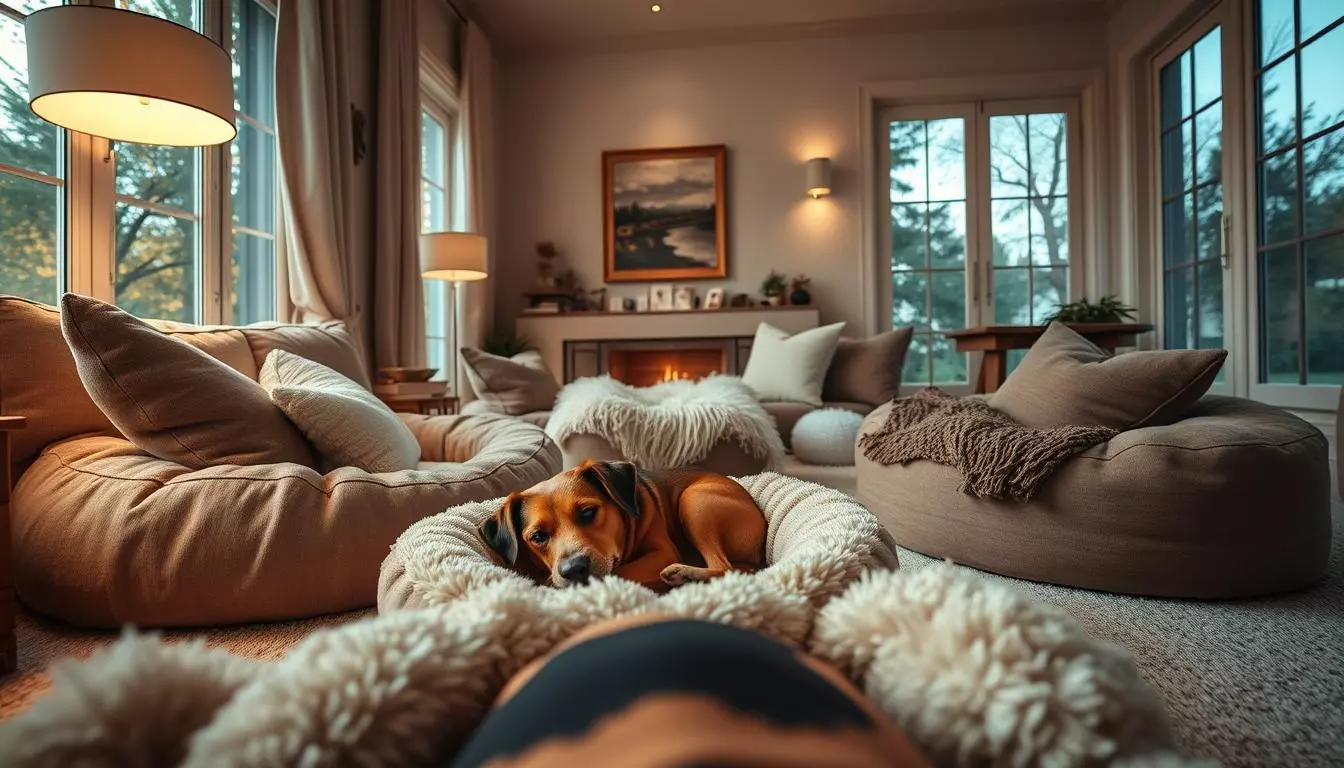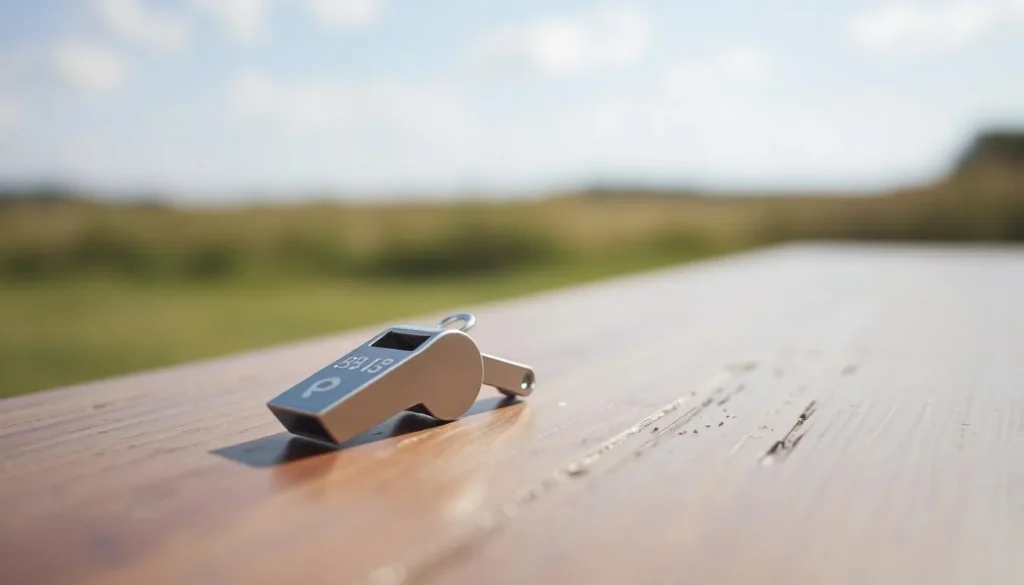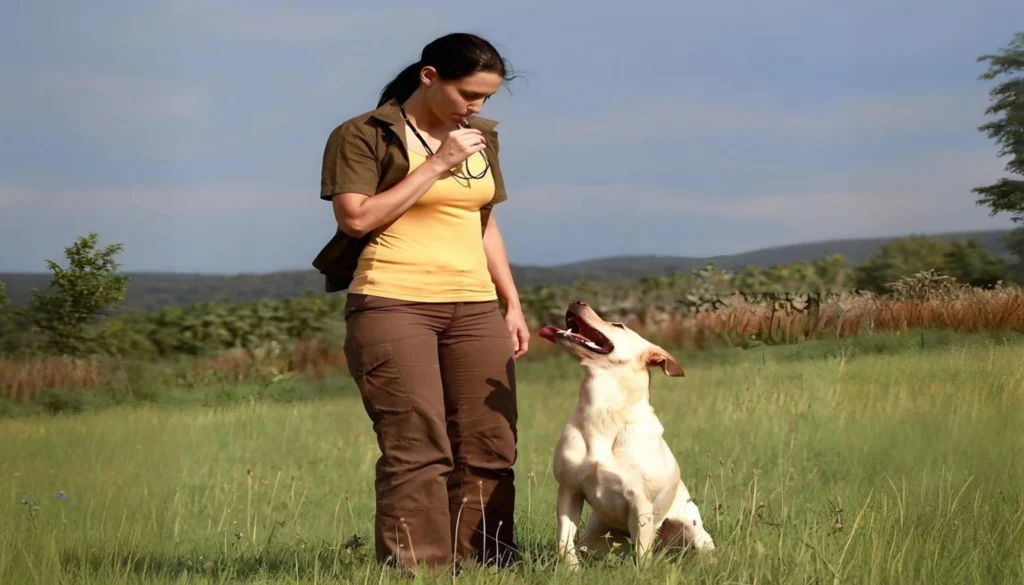As I sit on my couch, watching my dog sleep, I think about how important a cozy spot is for them. Dogs, like us, need good sleep to feel their best. They spend a lot of energy playing and exploring, so they need a quiet place to rest.
But where should my dog sleep at night? This is a big question for dog owners. It's not just about picking a bed or crate. It's about finding the right spot for their comfort and safety.
In this article, we'll look at the best sleeping spots for dogs. We'll talk about how important it is to meet their needs based on their age, health, and likes. We'll explore different options, from soft beds to cozy crates. And we'll learn how to make a safe, comfy space for them to dream.
Key Takeaways
- Understanding a dog's sleep needs is crucial for their health.
- Different sleeping arrangements serve various purposes.
- You can create a safe space for your dog to sleep soundly.
- Age and health influence where your dog should sleep.
- A comfortable sleeping environment enhances your dog's well-being.
Understanding Your Dog's Sleeping Needs
As a dog owner, I find it fascinating how each canine has unique sleeping needs. Factors like age, breed, and activity level play a significant role in determining how much sleep my dog requires. Generally, dogs need about 12-14 hours of sleep each day. Puppies, due to their rapid growth and energy requirements, often sleep even more—around 16-20 hours daily.
To meet these dog sleeping needs, I pay attention to recognizing my dog's sleep preferences. Observing his behavior can give me valuable insights. For instance, if my dog starts to lay down frequently or appears restless, it may indicate that he is feeling tired and requires a comfortable spot for rest.
Creating a suitable sleep environment is crucial. Identifying where he feels most relaxed can help in providing a perfect resting space. Ensuring this environment meets my dog's sleeping preferences contributes to better overall health and well-being. Monitoring these habits continues to deepen my understanding of his specific needs.
Why is Sleep Important for Dogs?
Dogs need sleep just like humans do. It helps them recharge and stay healthy. A well-rested dog has a stronger immune system and is less likely to get sick.
Good sleep also helps dogs heal faster after they play or exercise. Dogs that don't sleep well might get irritable or anxious. This shows how important a quiet place to sleep is for them.
A comfortable sleep area is key for a dog's health and happiness. It makes them feel safe and happy. So, when dogs sleep well, they do better in every way.
The Role of Age in Choosing Sleeping Spots
My dog's age is key when picking their sleeping spot. Puppies love soft, cozy places that feel safe. These spots help them feel secure as they grow.
As dogs get older, they need different beds. Adult dogs need beds that support their size and health. Big dogs like lots of room to stretch out.
Older dogs have special needs, too. Arthritis can make sleeping hard, so orthopedic beds are a good choice. These beds help support their joints, making sleep better.
Where Should My Dog Sleep at Night?
Choosing the right sleeping spot for my dog is important. It depends on their needs and what they like. Options like dog beds, crates, and sleeping with me have their own benefits. I need to think about how these choices affect their health and happiness.
Common Sleeping Arrangements
There are several popular sleeping setups to choose from:
- Dog Beds: These offer comfort and support, especially with memory foam that helps joints.
- Crates: Crates provide a sense of safety, making them great for many dogs.
- Co-Sleeping: Sleeping together strengthens our bond, but might disrupt our sleep.
Each option has its own benefits, fitting different dogs' personalities and needs. Watching how my dog acts helps me pick the best spot for them.
Health Considerations
When picking a sleeping spot, my dog's health is key. Here are some things to remember:
- Accessibility: Dogs with mobility issues need beds they can easily get to.
- Cleanliness: Keeping their sleeping area clean is crucial to avoid health problems.
- Support: Dogs with health issues might need beds that offer extra support and comfort.
By focusing on my dog's health and comfort, I can choose the best sleeping spot for them.
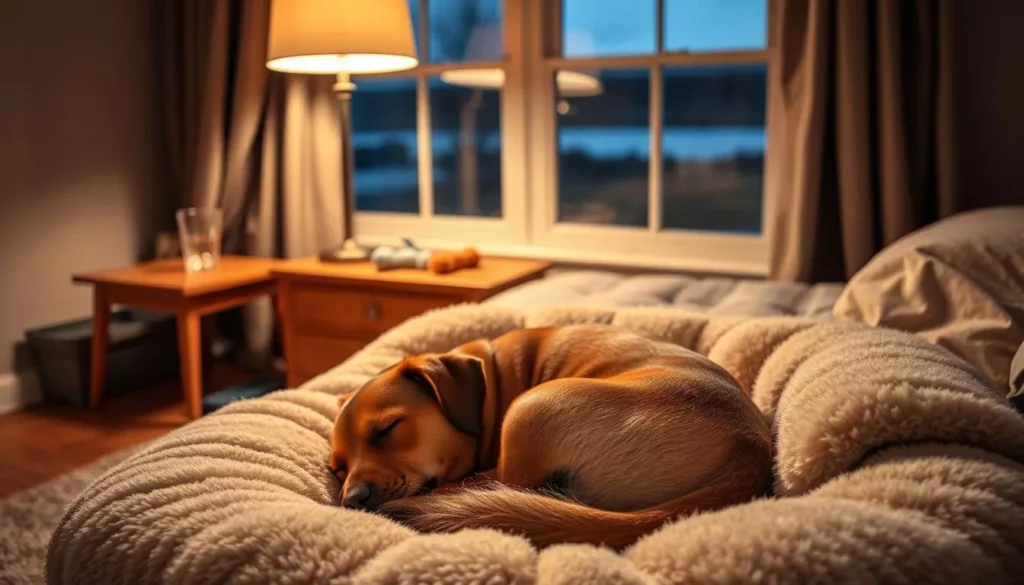
Choosing a Dog Bed
Finding the right dog bed is key for my furry friend's happiness. The best dog beds offer comfort and support. They meet my dog's specific needs.
An orthopedic dog bed is great for older dogs or those with joint issues. It helps ease pain and improves sleep.
When picking a bed, size matters a lot. I want it to fit my dog well, so they can stretch out. The bed's material should be tough and easy to clean. This keeps their sleeping area clean.
Special beds that match a dog's sleep style can make a big difference. Whether they like to curl up or stretch out, the right bed improves their sleep and health.
| Feature | Traditional Dog Bed | Orthopedic Dog Bed |
|---|---|---|
| Support | Basic support | High-quality orthopedic support |
| Comfort Level | Variable | Enhanced comfort for joints |
| Size Options | Limited | Wide range of sizes |
| Ease of Cleaning | Standard | Machine washable covers available |
Choosing the right bed is important for my dog's comfort. It's about meeting their needs for a happy, healthy life.
Benefits of Crate Training
Crate training has many benefits for my dog and our relationship. It creates a cozy, safe space for them to sleep. It also gives them a sense of security, like a natural den.
Creating a Safe Space
One big plus of crate training is it makes a safe area for my dog. A crate that's the right size lets them move around comfortably. It makes them feel safe, especially during loud events like thunderstorms.
This safe spot helps my dog feel more confident. They learn to handle new things better, staying calmer.
Potty Training Advantages
Crate training also helps a lot with potty training. Dogs naturally want to keep their sleeping area clean. Using a crate helps teach them to wait to go outside.
This makes potty training easier and more consistent. It helps reduce accidents in the house.
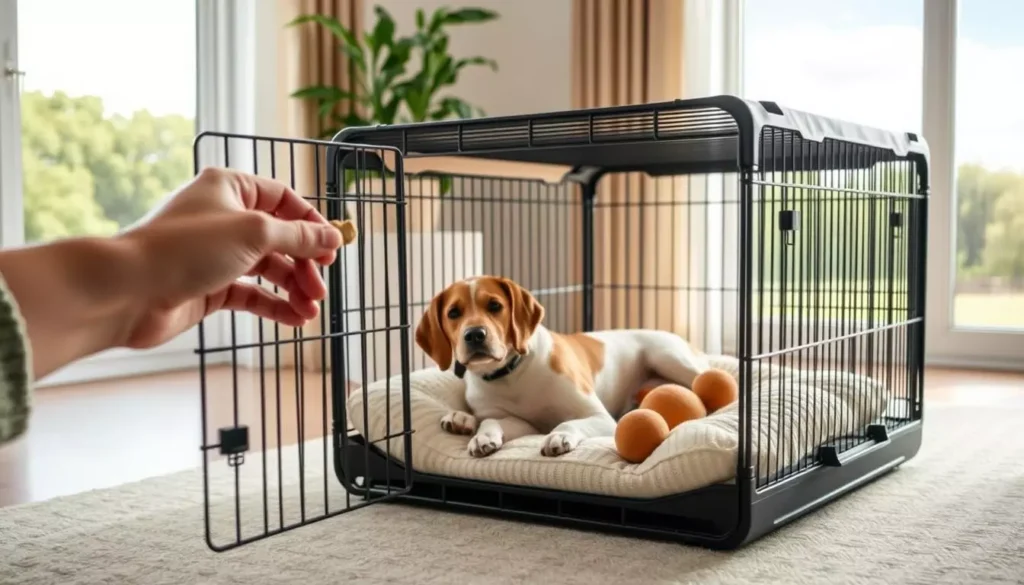
Co-Sleeping with Your Dog
Sharing a bed with your dog can strengthen your bond. It brings emotional support and warmth. This makes both the pet and owner feel comfortable.
However, there are downsides. Sleep disturbances can happen if your dog moves or snores. Also, bedding might need washing more often. It's important to think about these points before deciding.
At the end of the day, it's up to you. Co-sleeping can be a joy for many, making the human-animal bond stronger. If you're considering it, think about your lifestyle and sleeping habits first.
Separate Sleeping Arrangements
Creating separate sleeping spots for dogs can boost their independence. This setup lets pets have their own space, making separations easier. Knowing when to keep dogs out of the bedroom helps everyone sleep better.
Independence and Space
Encouraging dogs to sleep alone builds confidence and autonomy. A designated bed or crate sets boundaries. This promotes security and better habits in pets.
Dogs learn to settle down by themselves, enjoying quiet time without needing owners. This independence creates a peaceful home atmosphere.
When to Keep Your Dog Out of the Bedroom
There are times when dogs should sleep elsewhere. If their barking or restlessness disturbs sleep, setting boundaries is key. A routine that includes clear communication and training helps dogs adjust to sleeping outside.
This approach ensures peaceful nights for all, allowing everyone to get a good night's sleep.
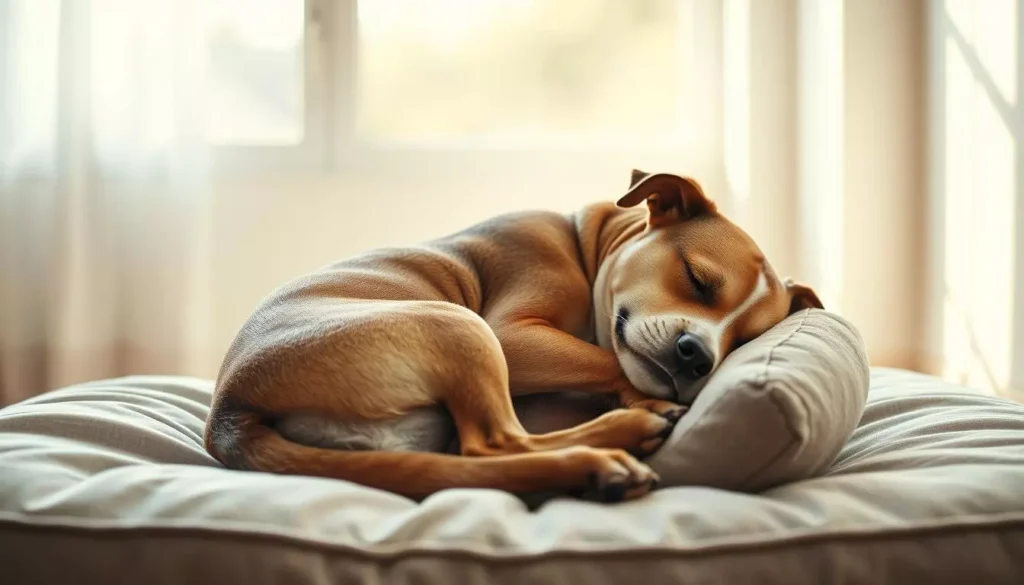
| Reason for Separate Sleeping | Benefits |
|---|---|
| Restlessness at Night | Better sleep for humans and dogs |
| Establishing Boundaries | Promotes confidence and independence |
| Reducing Disruptions | Improved overall household harmony |
| Encouraging Independence | Helps pets manage separation anxiety |
Creating a Cozy Sleeping Environment
Creating a cozy sleeping spot for dogs is key to their happiness. I focus on the temperature, humidity, and airflow to make sure it's just right. This helps my dog sleep well at night.
Temperature and Comfort Factors
Keeping the temperature between 65°F to 75°F is crucial. This range makes sure my dog is comfortable. I also keep their bed away from drafts and heat to avoid discomfort.
Reducing Distractions for Better Sleep
To help my dog sleep better, I reduce noise and bright lights. Soft background sounds, like white noise, help them relax. It's important they feel safe and calm in their sleeping area.
Special Considerations for Puppies
When it comes to my puppy's sleeping arrangements, comfort and security are key. Puppies can feel anxious when away from their owners, especially in the early months. A cozy crate or small bed in my bedroom is perfect.
This setup eases their anxiety and makes them feel safe. It's important to keep their sleeping area safe from hazards. A space without sharp objects or small items is best for their well-being.
Checking on their sleeping spot regularly helps me understand their preferences. This way, I can adjust the environment as needed. A routine around sleep time helps my puppy associate specific cues with rest.
Providing blankets or toys makes their sleeping area more inviting. A healthy and secure sleeping arrangement is vital for their growth and emotional stability.
Adjusting Sleeping Arrangements for Senior Dogs
As our furry friends get older, their sleep needs change a lot. Senior dogs might have arthritis or hip dysplasia, making it hard to sleep well. It's important to make changes in their sleeping spots to help them.
Choosing the right bed is crucial. Orthopedic beds with memory foam are great for support. They help ease pressure and make it easier for older dogs to move.
It's also key to place the bed in a quiet spot. Older dogs like a calm place to sleep. Make sure their bed is in a spot that's easy to get to and from.
Keep an eye on how your dog's bed needs change over time. Making adjustments as needed can really help your senior dog sleep better and feel better overall.
Conclusion
The right sleeping spot for my dog depends on their age, health, and what they like. Knowing these things helps me make their sleep area the best it can be.
Good sleep is key for my dog's health and happiness. Finding the right sleeping spot can also make our bond stronger. It means we both get a good night's sleep.
By focusing on what's best for my dog, we both live better together. It's all about making sure they're comfortable and happy at night.

